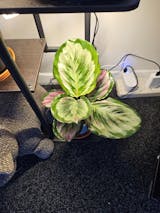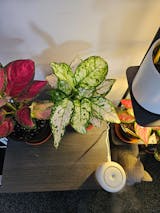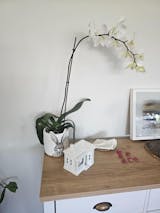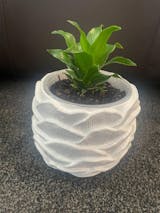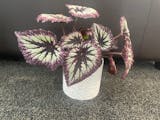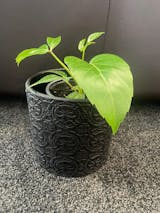What are Gnats?
If you own houseplants, chances are, you've encountered gnats at some point. They are those little pesky flies, that hang around your plants and are a real nuisance! They look similar to fruit flies but are completely unrelated. They are around 1/8-1/10th of an inch long and are attracted to damp areas, such as the soil of your plants.
Fruit flies on the other hand, are slightly larger and attracted to the sweet scent of decaying fruit and vegetables. Gnats have slender bodies, with long thin wings and are dark brown to black in colour. Gnats don't bite like mosquitos do, although they do like hanging around you, as much as your plants, so they'll often let you know when they've made a home in your house.

Where do Gnats come from?
They can enter your home in a number of ways, such as through open doors and windows and sometimes, they hitchhike a ride on plants that you bring into your home. Gnats are not an indication that you have a dirty or unhygienic home, so don't worry, these are unfortunately common pests that love your plants!
You may be pleased to know however, that just because you have plants in your home, doesn't mean that you have to put up with annoying gnats. There are things that you can do to prevent them and get rid of them when they do appear. Let's take a closer look.
Do Gnats harm my plants?
They can do. However, if you get on top of them quickly, they will rarely cause any major harm. If left untreated, gnats can multiply as they breed and in extreme cases, you could be subjected to a serious infestation. We are talking about lots and lots of gnats in this case, not just a few hanging around your plants! In this case, which to be honest, is rare, the larvae will feed off the roots of your plants, which is obviously not a great outcome for the health of your plants. You may see yellowing leaves and the plant generally declining in health. When a plants health is compromised, this opens the plant up to further pests and diseases, so it's important to prevent and eliminate gnats to avoid this from occurring.
How can you prevent Gnats?
Preventing gnats from entering your home is the first step to avoiding an infestation. Here are some tips to prevent gnats:
-
Use Quality Soil: Use high-quality soil that is free of pests and diseases. Sometimes your home acquires gnats through the soil you bring into your home. Avoid using soil that has been used before, as it may contain eggs or larvae that can lead to a gnat infestation. I also recommend mixing perlite into your soil. This helps with drainage and the aeration of your soil, reducing the likelihood of gnats.
-
Water Plants Sparingly: Overwatering is a common cause of gnat infestations. Water your plants only when the top of the soil is dry to the touch. Avoid allowing water to sit in the saucer under the plant, as this can create a breeding ground for gnats. If you are new to plants, we recommend a moisture meter to help you to know how wet the soil is further down the pot. This is a useful tool whilst you're learning and sometimes the results are surprising! Getting the watering aspect right, is not just useful for gnat control, it's the lifeline of your plants. Don't make it easy for them to hang around!
-
Clean Up Spills Promptly: Gnats are attracted to moisture, so it is important to clean up any spills or leaks promptly. This includes spills in the kitchen, bathroom, and any other areas of the home where moisture is present and of course, those little drips that don't quite make the pot when you water your plants. I always carry a cloth with me as I water, to wipe up any excess as I go.
-
Keep Your Plants Clean: Regularly wipe down the leaves of your plants with a damp cloth to remove any dust or debris. This will help prevent gnats from breeding on the leaves of your plants. I also recommend the use of Neem oil as this is a natural insecticide that will prevent a gnat infestation. I recommend Plant Runner, as it's easy to use on your plants, designed to be applied directly to the leaves and therefore safe to use, and produces a beautiful shine.

-
Keep Your Home Clean: Regularly cleaning your home can help prevent gnats from entering. Wipe down counters, clean up spills, and dispose of any decaying plant matter or food scraps promptly.
-
Use a Fan: Fans are not just to keep you cool! Gnats are weak fliers, so using a fan can help keep them away from your plants and out of your home. Place a fan near your plants to create a breeze that will make it difficult for gnats to fly. Just make sure you're not pointing it at plants that don't like draughts as you'll create another problem!
-
Use a Soil Cover: A layer of sand or gravel on the top of your plant's soil can help prevent gnats from laying their eggs in the soil. Whilst this works, I'm not a huge fan of this approach. Mainly because it makes it a little more difficult to feel the soil and therefore determine if the plant needs watering. If you do take this approach, ensure that the layer is thin and able to be moved to check your soil.
-
Apple Cider Vinegar: Gnats love this stuff! They may well just like it more than your plants, which believe me, is a good thing. You can place small ramekins of apple cider vinegar around your plants when you see the odd gnat, and they will then be attracted to the vinegar and ultimately drown in it - sorry, gnats! I've also heard that placing a few drops of dishwashing liquid into the vinegar, helps with the drowning process, as they find it hard to fly out.

How to get rid of Gnats:
Ok, so you've spotted a few flying around - don't panic, they aren't harming your plants just yet. Here's a few things that you can do to get rid of them fast.
- Clean up any decaying plant matter or food scraps. If a plant is showing signs of gnats, let the soil dry out a little longer than usual. Gnats don't like dry soil, so this will help them to leave your plants alone.
-
Trap Them: Sticky traps are an effective way to trap gnats. These traps work by attracting gnats to a sticky surface, where they become stuck and die. Place these traps near areas where gnats are most commonly found, such as near potted plants or in the kitchen. You can buy these from most garden centres or large stores such as Mitre 10 or Bunnings. I personally don't like the look of them, so use other options (see below), however, they are effective for a small infestation.

- Kill the adults: The gnats that you see flying around, are able to breed. That means that they will lay eggs in the soil of your plants, multiplying the number of gnats you have in your home. Therefore, you want to remove these adults to prevent further breeding. You can use a houseplant insect spray to safely spray on the top of your soil when gnats are spotted. You can also use a fly spray on the gnats, so long as the spray isn't going to directly touch your plants. I have found the Raid earth options botanicals mutli insect killer fly spray, safe to use around my plants. You don't need much to rid gnats, just a light spray in the area.
- Remove the larvae (eggs) from the soil: Gnats lay eggs in the top inch of the soil. Therefore, you can remove the top inch of soil by using the likes of a teaspoon and discarding this layer. Once discarded, replace it with fresh soil, preferably on the drier side.
-
Vacuum Them Up: A vacuum cleaner can be used to remove adult gnats from the home. Be sure to dispose of the vacuum bag or canister promptly to prevent any remaining gnats from escaping.
So, there you have it! The ins and outs of gnats, what you need to know and how to prevent and rid them from your homes. I truly hope this has helped to put your mind at ease, that whilst gnats are super annoying, they are easy to prevent and get rid of when they inevitably decide that your home is a nice place to hang! As always, if you have any further questions I can help with, don't hesitate to get in touch. I love talking all things plants and would absolutely love to help you. You can add a comment or question below, connect with me via Facebook messenger through our Lily Pot page or email me on chontelle@thelilypot.co.nz.
Thanks for reading this blog and stopping by, we truly appreciate your support and interest and hope this has helped you on your plant journey.


















